- CANADIAN PALE
- A term used when the central stripe in a vertical triband has
internal proportions of 1-2-1 as in the Canadian national flag – but see
the notes
below and ‘unequal triband’
(also ‘proportions 2)’,
‘pale’,
‘triband’ and
‘tricolour’).
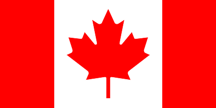

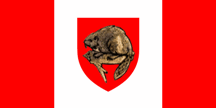
National Flag of Canada (fotw);
Flag of Sainte-Angèle-de-Prémont, Canada (fotw);
Flag of Brantford, Canada (fotw)
Notes
a) It is
strongly suggested that this Dictionary's entry on pale and/or
a suitable glossary or heraldic dictionary be consulted before using this term, and that if used
at all it should apply only to Canadian Flags.
b) This term refers solely to a flag’s internal proportions rather than to
the colours used, and that that Canadian sub-national flags can show a
considerable variation on those colours.
- CANTABRIAN LABARUM
- The flag of the Cantabrian independence movement showing a wheel-like emblem that is
considered symbolic of the ancient Cantabrians of Northern Spain – see 'labarum 1)'.
![[Cantabrian Lebarum]](../images/v/vxt-d066.gif)
The Cantabrian Labarum (fotw)
- CANTABRARII
- Bearers of the ‘cantabrum’.
- CANTABRUM
- An ancient Roman cavalry standard of uncertain configuration - but see note below.
Please note - not to be confused with a cantabrian labarum, although, this is believed (by some sources) to be a later interpretation of the ancient design -
(see 'cantabrian labarum').
- CANTING
- A heraldic term used when the design on a shield or any quartering thereof,
on a banner of arms or a flag
forms a pun on the name or attributes of the entity or person represented –
allusive or punning arms or armes parlantes (see
also ‘armorial bearings’).
![[Greifensee, Switzerland - canting]](../images/v/vxt-d4519.gif)
![[Brodski Stupnick flag - canting]](../images/v/vxt-d4897.gif)
![[canting]](../images/v/vxt-d5347.gif)
Flag of Stokke, Norway (fotw);
Flag of Brodski Stupnik, Croatia fotw);
Flag of Bischofszell, Switzerland (fotw)
Notes
a) Stup is the Croatian for column.
b) The Norwegian for stick is Stokke
c) Bischof means bishop in German.
- CANTON
- 1) Commonly, all or part of the upper hoist – or first - quarter of a flag’s
field that has no vertical divisions and/or is otherwise undivided - the canton (see also
‘Appendix I’,
‘inner canton’ and
‘quarter 1)’).
- 2) A rectangular (or square) area of colour or design different from the field
in the above position, which may occupy exactly one quarter of the flag or a larger
or smaller area (see also ‘canton flag’ below,
‘covering’,
‘quarter 1)’ and
'Union’).
- 3) One of the four quarters of a flag, divided horizontally and vertically into:
(1) the upper hoist or upper hoist canton,
(2) the upper fly or upper fly canton,
(3) the lower hoist or lower hoist canton and
(4) the lower fly or lower fly canton
corresponding to quarters one to four of a shield divided quarterly
(see also ‘Appendix I’,
‘grand quarter’,
‘quarter 2)’,
‘quarterly’,
‘hoist’ and
‘fly’).
- 4) In heraldry as definition 2) except (although apparently of no fixed size)
heraldic use frequently suggests that a canton should occupy one-third of the
chief (see also ‘cantoned 1)’ and ‘chief’).
![[canton example]](../images/v/vxt-d4955.gif)
![[canton example]](../images/v/vxt-d656a.gif)
![[canton example]](../images/v/vxt-d656c.gif)
Civil Ensign of New Zealand (fotw);
Flag of Kelantan, Malaysia (fotw);
the four quarters, quarter 1 being the canton
Please note that “canton” is also the title by which the major sub-divisions of several countries (states, counties etc.) are known (see also ‘cantonal arms’ and ‘cantonal flag’).
- CANTONAL ARMS (or COAT OF ARMS)
- The arms of a territorial division within a country when that
subdivision is called a canton – e.g., one of those cantons (regions) that
make up the Swiss Confederation, or those of Bosnia-Herzegovina or Costa Rica
- see ‘state arms 3)’ under ‘arms’
(also ‘cantonal flag’).
![[Thurgau arms]](../images/v/vxt-d5348.gif)
![[Buenos Aires, Costa Rica arms]](../images/v/vxt-d3666.gif)
![[Posavina arms]](../images/v/vxt-d290.gif)
Arms of Thurgau, Switzerland (Wikipedia);
Arms of Buenos Aires, Costa Rica (Zeljko Heimer & fotw);
Arms of Posavina, Bosnia-Herzegovina (fotw).
- CANTONAL FLAG (or BANNER)
- The sub-national flag of a territorial division within a country when that subdivision is called a canton - e.g. one of the
cantons which make up the Swiss Confederation, or of Bosnia-Herzegovina,
Ecuador or Costa Rica
(see also ‘cantonal arms’ and ‘sub-national
flag’).



Flag of Buenos Aires, Costa Rica (fotw);
Flag of Vaud, Switzerland (fotw); Flag of
Carlos Julio Arosemena Tola, Ecuador (fotw)
- CANTONAL TRIANGLE
- The newly introduced term for a right-angled, triangular panel set with
its legs (or catheti) along the hoist and upper edge of a flag as illustrated
below – but see ‘triangular panel 1)’.
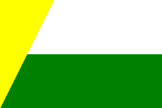
Flag of
Imues, Colombia (fotw)
- CANTONED CROSS
- In heraldry see ‘cross cantonée’.
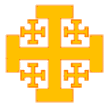
Flag
of the
Kingdom of Jerusalem c1200 (CS)
- CANTONED (or CANTONÉE)
- 1) See ‘cross cantonée’ (also ‘canton 4)’).
- 2) Alternative heraldic terms sometimes (incorrectly) used to describe a charge or charges set in the cantons of a shield that does not carry a cross or saltire
- cantonée (see also ‘saltire’).
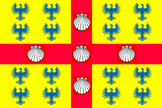

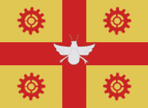
Flag of Précigné, France (fotw); Arms of
Figueiró dos Vinhos, Portugal (fotw);
Flag of Iracemápolis, Brazil (fotw)
- CANTON FLAG
- 1) A term used to describe the canton of a flag, or to describe the flag
itself, when its canton consists of another flag, as in for example, those examples illustrated below –
a nationally cantoned flag
(see also ‘armorial ensign 2)’,
‘British style ensign’, ‘canton 2)’,
‘canton of St. George’,
‘civil ensign’ under ‘ensign’
and ‘colonial flag’).
- 2) See ‘cantonal flag’.

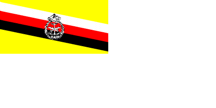
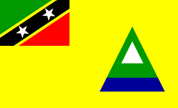
Flag of Niue (fotw); War Ensign of Brunei
1990-2010(fotw); Flag of the Island of
Nevis until 2019 (fotw)
- CANTON OF ST. GEORGE
- The term used when a flag’s canton is formed by the red cross of St George on
its white field – a St George’s canton (see also ‘canton 2)’,
‘canton flag’, ‘St George’s Cross 2)’
and ‘St. George's ensign’.
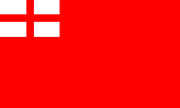

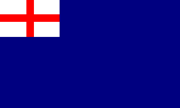
Red Ensign c1625 – 1707,
White Ensign c1630 – 1702,
Blue Ensign c1630 – 1707, England (fotw)
- CAP BADGE
- See ‘badge 3)’.
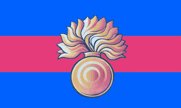
Camp Flag of the Grenadier Guards showing their Cap Badge, UK (fotw)
- CAP OF LIBERTY
- An ancient symbol in the form of a soft red cap which, as a consequence of having been
adopted by various revolutionary movements during the 18th century, has come to be regarded as a
symbol of resistance against monarchical or imperialist oppression – a liberty, Phrygian or
Scythian cap.

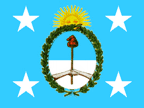
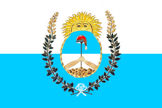
Presidential Transport Flag and
Flag Afloat,
plus the Flag of the Army of the Andes 1817-18, Argentina (fotw)
- CAPPELINE
- In heraldry see ‘mantling’.

(International Heraldry)
- CAPTAIN’S COLOUR (or COLOR)
- See ‘stand of colours 1)’ and ‘venn’.
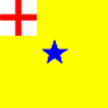
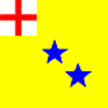
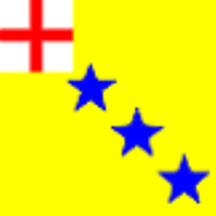
Examples of First – Third Captain’s Colours in Venn A,
English c1641 (fotw)
- CAPTURED FLAG
- See ‘trophy flag’.
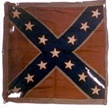
Flag Captured at Blakely, Alabama 1 April 1865 (civil-war.com)



![[Cantabrian Lebarum]](../images/v/vxt-d066.gif)
![[Greifensee, Switzerland - canting]](../images/v/vxt-d4519.gif)
![[Brodski Stupnick flag - canting]](../images/v/vxt-d4897.gif)
![[canting]](../images/v/vxt-d5347.gif)
![[canton example]](../images/v/vxt-d4955.gif)
![[canton example]](../images/v/vxt-d656a.gif)
![[canton example]](../images/v/vxt-d656c.gif)
![[Thurgau arms]](../images/v/vxt-d5348.gif)
![[Buenos Aires, Costa Rica arms]](../images/v/vxt-d3666.gif)
![[Posavina arms]](../images/v/vxt-d290.gif)























